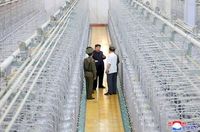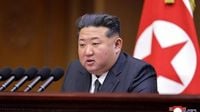South Korea has sounded a fresh alarm over North Korea’s nuclear ambitions, revealing that Pyongyang is now believed to possess as much as 2,000 kilograms—about 4,400 pounds—of highly enriched uranium at a weapons-grade purity of 90 percent or higher. The announcement, made on September 25, 2025, by South Korea’s Unification Minister Chung Dong-young, marks a rare public confirmation of the scale of the North’s nuclear material stockpile and suggests a sharp increase from previous estimates.
According to multiple South Korean officials and corroborated by intelligence assessments, North Korea is operating uranium centrifuges at four separate sites. The only named location is the infamous Yongbyon nuclear complex, which sits roughly 100 kilometers north of Pyongyang. Though Pyongyang claimed to have decommissioned Yongbyon after earlier denuclearization talks, it was reactivated in 2021, a move that signaled the regime’s intent to ramp up its nuclear program after diplomatic efforts with the United States stalled.
“Even at this very hour, North Korea’s uranium centrifuges are operating at four sites,” Minister Chung told reporters, as cited by France 24 and other outlets. The minister declined to elaborate on the locations of the other, undeclared nuclear sites, but emphasized the seriousness of the situation. “Stopping North Korea’s nuclear development is an urgent matter,” Chung said, yet he argued that sanctions alone would not be effective. “The only solution lies in a summit between Pyongyang and Washington.”
The magnitude of North Korea’s uranium stockpile is troubling. The International Atomic Energy Agency (IAEA) estimates that 42 kilograms of highly enriched uranium is needed to produce a single nuclear weapon. By that measure, North Korea’s current reserves could be enough for roughly 47 nuclear bombs. Chung highlighted the gravity of the situation, noting that “only five to six kilograms of plutonium is enough to build a single nuclear bomb,” and that the North’s uranium could be reserved solely for plutonium production, making it possible to construct “an enormous number of nuclear weapons.”
While North Korea has long been suspected of holding a “significant” amount of highly enriched uranium, this is one of the first times a senior South Korean official has publicly quantified the stockpile. The estimate, Chung clarified, is based on intelligence agencies and civilian experts, including the Federation of American Scientists (FAS). It represents a dramatic jump from previous assessments. For instance, in 2018, Stanford University’s Siegfried Hecker and colleagues estimated that North Korea held between 250 and 500 kilograms of highly enriched uranium—enough for 25 to 30 nuclear devices. The new figure suggests that North Korea’s nuclear arsenal could be far larger than previously thought.
North Korea has never publicly disclosed the full extent of its uranium enrichment facilities. However, the country did release images of what it claimed was a uranium enrichment plant in 2024, the first such disclosure since 2010, when it showed the Yongbyon site to visiting academics. The secrecy surrounding the other three sites only deepens international concerns about the regime’s nuclear intentions and capabilities.
Despite years of international sanctions and diplomatic pressure, North Korea has forged ahead with its nuclear weapons program. The country conducted its first nuclear test in 2006 and has since faced a barrage of United Nations sanctions for its banned weapons programs. Yet, as South Korea’s defense ministry and various intelligence sources have repeatedly noted, these measures have not stopped Pyongyang from expanding its arsenal. In fact, the North’s nuclear activities appear to have accelerated in recent years, particularly after the collapse of high-stakes diplomacy in 2019 between North Korean leader Kim Jong Un and then-U.S. President Donald Trump.
The diplomatic deadlock has persisted ever since, with little sign of progress. In a twist that underscores the complexity of the situation, Kim Jong Un said this week that he is open to talks with the United States—provided that Washington drops its demand for North Korea to surrender its nuclear arms as a precondition for negotiations. According to the Korean Central News Agency, Kim reiterated that he would never make his nuclear arsenal a “negotiating point.”
South Korea’s approach to the North has also shifted in recent months. President Lee Jae Myung, who took office in June 2025, has promised a more dovish stance toward Pyongyang compared to his hawkish predecessor, Yoon Suk-yeol. In an address at the United Nations earlier this week, Lee vowed to break the “vicious cycle” of tensions on the Korean Peninsula and pledged not to seek regime change in the North. This softer approach stands in contrast to that of the previous administration, which had designated North Korea as the “main enemy” and insisted on denuclearization as a prerequisite for dialogue. Minister Chung was blunt in his assessment, stating that such policies had “effectively allowed North Korea’s nuclear capabilities to expand without limit.”
The debate over how best to curb North Korea’s nuclear ambitions remains as contentious as ever. While some argue that sanctions and pressure are necessary to deter Pyongyang, others, like Minister Chung, believe that only direct engagement and summit-level diplomacy can break the current impasse. “Sanctions will not be effective,” Chung insisted, pointing to the North’s continued enrichment activities and growing stockpile as evidence.
The stakes could hardly be higher. With enough highly enriched uranium to produce dozens of nuclear bombs, North Korea’s arsenal presents a clear and present danger not only to the Korean Peninsula but to the broader region and global nonproliferation efforts. The fact that Pyongyang continues to expand its nuclear program despite international isolation and economic hardship is a testament to the regime’s determination—and its belief that nuclear weapons are essential to its survival.
As Seoul calls for renewed dialogue and Washington weighs its options, the world watches with bated breath. The next steps taken by all parties will determine whether the Korean Peninsula moves closer to peace or faces a new era of heightened nuclear risk.
The revelation of North Korea’s expanded uranium stockpile is a sobering reminder that, despite years of sanctions and intermittent diplomacy, the nuclear crisis remains unsolved—and perhaps more urgent than ever.


